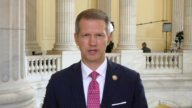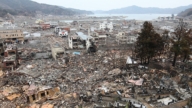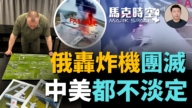【新唐人2012年1月7日讯】美国总统奥巴马1月5号公布了新的国防计划,削减国防开支近5000亿美元。值得关注的是,在美国军事战略调整的大格局中,亚太地区成为重点。同时,白宫不否认这份报告是针对中共建军而来。
奥巴马5号在五角大楼召开新闻发布会,公布最新的战略评估,计划在十年内至少削减4870亿美元的国防开支。
奥巴马表示,美军在经历了十年战争后,处于一个转型时期。美国当前的经济状况迫使美国削减国防开支。因此,美国将缩减地面部队规模,减少在欧洲的军事存在。不过奥巴马表示,美国将继续保持军事优势,同时将把军事重心转向中东和亚太地区。
奥巴马:“我们将加强我们在亚太的军事存在,在那个关键地区开支预算不会削减。”“我们将继续保持警惕,特别是在中东地区。”
同时出席新闻发布会的还有美国国防部长帕内塔,和参谋长联席会议主席马丁•登普西将军。
帕内塔宣布,美军人数在未来十年将缩编到49万人,他还表示,在国防预算削减后,美军将进一步增强特别行动、导弹防御以及网络作战等方面的能力,从而避免再发动如阿富汗和伊拉克战争那样的“大规模、长时间”的军事行动。
据了解,帕内塔预期将推迟美国最昂贵的武器购买项目——隐形战机F35,但不会缩减美国的十一个航空母舰战斗群的编制。白宫发言人卡尼当天被问及:这份报告是否针对中国而来时,并没有否认。
新唐人时事评论员陈志飞:“实际上在APEC会议之后,在当时美国就作出重返亚太,之后美国的媒体一致也是认为,这些行动的矛头也是剑指中共的。现在在这个时候美国政府又作出…从政策上正式的作出调整,说明这个举措,从亚太制衡中共极权,已经成为美国新的外交和战略策略。”
除了亚太以外,奥巴马也表示,美军不会减少在中东的存在并且将保持警戒,帕内塔也表示,将加强与中东盟友的合作,反击侵略性行为。一般认为这是针对伊朗而来。
政论家伍凡分析,美国新的国防计划中,有两个关键的地方!
伍凡:“一个就是南海,一个就是阿拉伯湾的荷姆兹海峡,这两个为什么重要呢?一个是涉及到全球的能源的路径。从中东、中亚出来的石油,首先第一关就是经过阿拉伯湾荷姆兹海峡﹔到远东来,就要经过南海。这两个正好是这两个国家﹙中共、伊朗﹚控制、影响的地区。所以他﹙美国﹚就把海、空军要放在这个地区。”
伍凡表示,美国未来十年的战略目标锁定中共和伊朗,但不再沿袭伊拉克、阿富汗战争的模式。
伍凡:“他不打陆军战了,不想伊拉克、阿富汗战争那样打,他用海空军来消灭你的基地,他的目地是不让你扩张出来,不让你对外头有威胁,但是他并不是去占领你,也不像去推翻伊拉克、阿富汗原来的政府,他只想把你抑制在那里,或者不让你扩张威胁到别人,所以这个战略就完全改变了,打法也改变了。”
另外,伍凡也表示,未来网路战的情势在提升中。他说,美国已经摆明了,发动网路战就是发动战争,美国现在开始对中共、伊朗和俄国的网路骇客行动,进行全面的反击。
新唐人记者秦雪、周平采访报导。
New layout of US defense strategy focuses on Asia-Pacific
On January 5, U.S. President Barack Obama announced a
new defense plan cutting defense spending up to $500 billion.
It is noteworthy that, in the pattern of U.S. military strategic
adjustment, the Asia-Pacific region becomes the focus.
Meanwhile, the White House does not deny the report targets
the Army of the Chinese Communist Party (CCP).
On January 5, Obama held a news conference at the Pentagon
and announced the latest strategic assessment.
He is planning to cut defense spending by at least $487 billion
within the next decade.
Obama said that after 10 years of war, the U.S. military is in a
transition period.
The current economic situation forces him to cut defense costs
reducing ground forces and the military presence in Europe.
However, Obama said that the U.S. will continue to maintain
military superiority, whilst shifting military focus.
The U.S. will concentrate on the Middle East and Asia Pacific.
Obama: “We will be strengthening our presence in the Asia
Pacific and budget reductions will not come at the expense of
that critical region. … … We will stay vigilant.
Especially in the Middle East."
Also present at the press conference were the U.S. Secretary
of Defense Panetta.
Who was joined by Joint Chiefs of Staff Chairman Gen.
Martin Dempsey.
Panetta announced that the number of U.S. military will
downsize to 490 thousand in the next decade.
He also said that after defense budget cuts, the U.S. military
will further strengthen special operations and missile defense.
Also increasing network warfare capacity to avoid “large-scale
long time" military actions such as Afghanistan and Iraq wars.
It is understood Panetta will postpone the purchase of U.S.’s
most expensive weapons program, stealth fighter F35.
However he will not reduce the establishment of the eleven U.S.
aircraft carrier battle group.
When White House spokesman Carney was asked that day
whether this report is targeting China, he didn’t deny it.
NTDTV commentator Chen Zhifei: “In fact, after the APEC
meeting, the U.S. decided to return to the Asia-Pacific region.
Following this, the U.S. media all believe that the spearhead of
these actions is targeting the CCP.
Again the U.S. shows it by making a formal policy adjustment
indicating this initiative of checking and balancing the
totalitarian CCP from the Asia-Pacific has become new U.S.
diplomatic and strategic policies. “
As well as Asia-Pacific, Obama said that U.S. military will not
reduce its presence in the Middle East, still remaining vigilant.
Panetta also said the U.S. will strengthen cooperation with its
allies in the Middle East to counter aggressive behavior.
It is generally believed that this targets Iran.
Political commentator Wu Fan analyzed that there are two key
points in the new U.S. defense program.
Wu Fan: “One is the South China Sea; the other is the Strait of
Hormuz of Arabian Gulf. Why are these two important?
It is related to the path of global energy.
Oil from the Middle East, Central Asia will arrive at the first
gate, namely, the Arab Gulf Strait Hormuz.
When being sent to the Far East, it has to go through the South
China Sea.
Both regions are controlled and affected by China and Iran.
So the U.S. put its navy and air forces in these areas."
Wu Fan said U.S. strategy in the next decade will target CCP
and Iran but not like wars fought in Iraq and Afghanistan.
Wu Fan: “He will not fight the ground battle. He doesn’t want
to fight in the same way as the wars in Iraq and Afghanistan.
He will use navy and air forces to destroy your base with the
goal of containing you so you are no threat to the outside world.
However, he will not occupy you. Neither will he overthrow
the old governments like Iraq and Afghanistan.
He just wants to restrain you there; make sure you are no threat.
The strategy and style of fight has completely changed."
In addition, Wu Fan also said the situation of future network
warfare is escalating.
He said the U.S. has made it clear that network warfare is
a war.
Against hacker network operations in CCP, Iran and Russia,
the U.S. now begins to conduct a comprehensive response.
NTD reporters Qin Xue, Zhou Ping and Zhou Tian




























